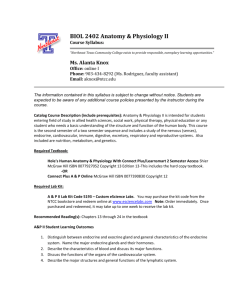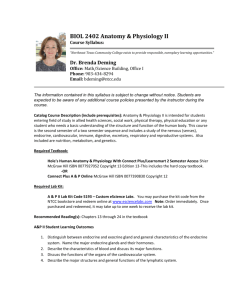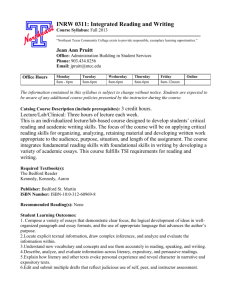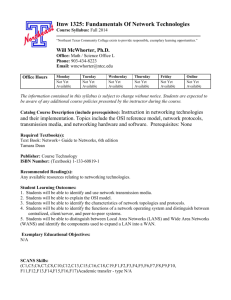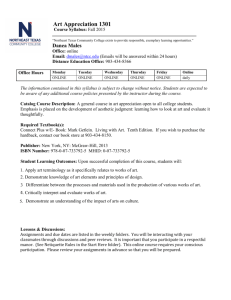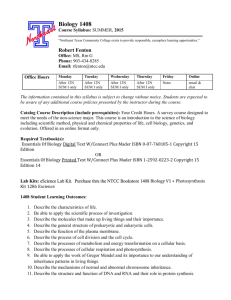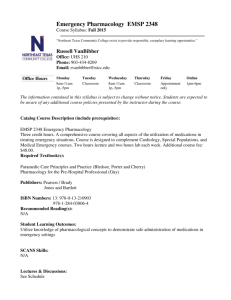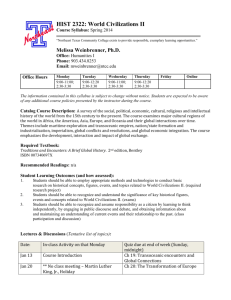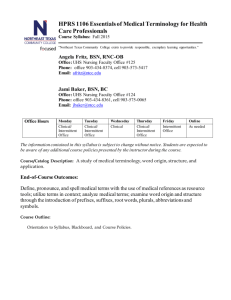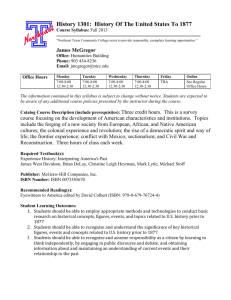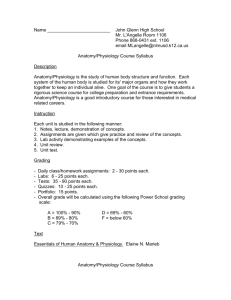BIOLOGY 1406 - Northeast Texas Community College
advertisement
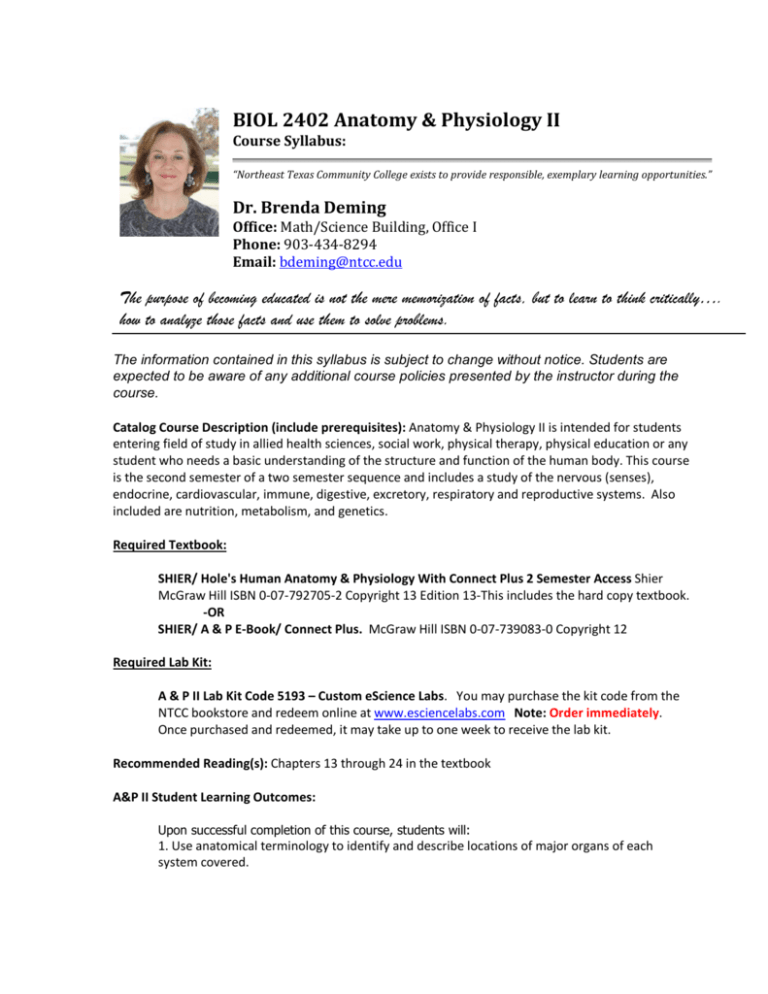
BIOL 2402 Anatomy & Physiology II Course Syllabus: “Northeast Texas Community College exists to provide responsible, exemplary learning opportunities.” Dr. Brenda Deming Office: Math/Science Building, Office I Phone: 903-434-8294 Email: bdeming@ntcc.edu The purpose of becoming educated is not the mere memorization of facts, but to learn to think critically…. how to analyze those facts and use them to solve problems. The information contained in this syllabus is subject to change without notice. Students are expected to be aware of any additional course policies presented by the instructor during the course. Catalog Course Description (include prerequisites): Anatomy & Physiology II is intended for students entering field of study in allied health sciences, social work, physical therapy, physical education or any student who needs a basic understanding of the structure and function of the human body. This course is the second semester of a two semester sequence and includes a study of the nervous (senses), endocrine, cardiovascular, immune, digestive, excretory, respiratory and reproductive systems. Also included are nutrition, metabolism, and genetics. Required Textbook: SHIER/ Hole's Human Anatomy & Physiology With Connect Plus 2 Semester Access Shier McGraw Hill ISBN 0-07-792705-2 Copyright 13 Edition 13-This includes the hard copy textbook. -OR SHIER/ A & P E-Book/ Connect Plus. McGraw Hill ISBN 0-07-739083-0 Copyright 12 Required Lab Kit: A & P II Lab Kit Code 5193 – Custom eScience Labs. You may purchase the kit code from the NTCC bookstore and redeem online at www.esciencelabs.com Note: Order immediately. Once purchased and redeemed, it may take up to one week to receive the lab kit. Recommended Reading(s): Chapters 13 through 24 in the textbook A&P II Student Learning Outcomes: Upon successful completion of this course, students will: 1. Use anatomical terminology to identify and describe locations of major organs of each system covered. 2. Explain interrelationships among molecular, cellular, tissue, and organ functions in each system. 3. Describe the interdependency and interactions of the systems. 4. Explain contributions of organs and systems to the maintenance of homeostasis. 5. Identify causes and effects of homeostatic imbalances. 6. Describe modern technology and tools used to study anatomy and physiology. 7. Apply appropriate safety and ethical standards. 8. Locate and identify anatomical structures. 9. Appropriately utilize laboratory equipment, such as microscopes, dissection tools, general lab ware, physiology data acquisition systems, and virtual simulations. 10. Work collaboratively to perform experiments. 11. Demonstrate the steps involved in the scientific method. 12. Communicate results of scientific investigations, analyze data and formulate conclusions. 13. Use critical thinking and scientific problem-solving skills, including, but not limited to, inferring, integrating, synthesizing, and summarizing, to make decisions, recommendations and predictions. Exemplary Educational Objectives: The objective of the study of a natural sciences component of a core curriculum is to enable the student to understand, construct, and evaluate relationships in the natural sciences, and to enable the student to understand the basis for building and testing theories. The exemplary educational core objectives for natural sciences are: 3.1 to understand and apply method and appropriate technology to the study of natural sciences; 3.2 to recognize scientific and quantitative methods and the differences between theses approaches and other methods of inquiry and to communicate findings, analyses, and interpretation both orally and in writing; 3.3 to identify and recognize the differences among competing scientific theories; 3.4 to demonstrate knowledge of the major issues and problems facing modern science, including issues that touch upon ethics, values, and public policies; 3.5 to demonstrate knowledge of the interdependence of science and technology and their influence on, and contribution to, modern culture. Lectures & Discussions for ONLINE A&PII: Week 1- Introduction Week 2- Chapter 13 Endocrine System Week 3- Chapter 14 Blood Week 4- Chapter 15 Cardiovascular System Week 5- Exam 1 (Ch. 13 - 15) Week 6- Chapter 16 Lymphatic System and Immunity Week 7- Chapter 17 Digestive System Week 8- Chapter 18 Nutrition and Metabolism AND Exam 2 (Ch. 16 - 18) Week 9- Midterm (Ch. 13-18) Week 10- Chapter 19 Respiratory System Week 11- Chapter 20 Urinary System; Week 12- Chapter 21 Balance AND Exam 3 (Ch. 19 - 21) Week 13- Chapter 22 Reproductive Systems Week 14- Chapter 23 Pregnancy, Growth, and Development Week 15- Chapter 24 Genetics and Genomics AND Exam 4 (Ch. 22-24) FINAL WEEK- Final Exam (Ch. 19-24) Evaluation/Grading Policy: Lecture Average 75% of final course grade Lab Average 25% of final course grade The “lecture” component of this course will consist of online homework/quizzes through McGraw-Hill Connect and examinations with the following weight in calculating final lecture average: 30% Exams (4 exams; each = 7.5%); 15% Midterm – Comprehensive; covers material from Exam 1 & Exam 2 15% Final Exam – Comprehensive; covers material from Exam 3 & Exam 4 15% Connect Online Assignments o Homework assignments are required. These can be done 2 times before the due date; 10% is deducted for second try. After the due date, these will be available for practice without changing your grade. However, this option prevents the ability to give a grade extension. o Quizzes are required. o LearnSmart assignments are recommended, but will not count towards grade. • • Exams 1-4 can be taken at home using Respondus Lockdown Browser . Midterm and Final exams will be proctored using Respondus Lockdown Browser. The “lab” component of this course will consist of online and Hands-on laboratory activities through eScience Lab Kit for A&P II: 25% Lab eScience Kit Online and Hands-on Labs. • The 2 lowest grades will be dropped Other Course Requirements: • This is an online course in Anatomy and Physiology. Both lecture and laboratory study materials and assignments will be delivered through the Blackboard Learning Management System at NTCC. • Familiarize yourself with the student portal on Bb. The “Student Resources” tab has answers to almost any question that you might have. There are tabs located here for “Student Services”, “Technical Support”, “Blackboard Assistance”, “Testing Information”, “Access Code Information”, and “Learning Resource Center (Library)”. • Exams will be taken using the Respondus Lockdown Browser. Students should ensure that they have the appropriate hardware, software, and technical skills for completing all assignments, labs and tests. Student Responsibilities/Expectations: • Northeast Texas Community College is a “community of scholars.” Please remember that you and all students in this class are pursuing very important goals in your lives. As scholars, I expect every student to be courteous to other students, the teaching assistants, and the instructor in both lecture and laboratory experiences. • The final day to withdraw with a grade of “W” is Nov.17, 2015. It is the student’s responsibility to withdraw by that date if he/she is not able to complete the course. • Plagiarism is not permitted. If you choose to do so, you will receive zeroes. Remember, cutting and pasting are forms of plagiarism. Put answers into your own words. • You are responsible for completing and submitting assignments by the due date on the schedule if you are to receive credit. No extensions will be given. NTCC Academic Honesty Statement: "Students are expected to complete course work in an honest manner, using their intellects and resources designated as allowable by the course instructor. Students are responsible for addressing questions about allowable resources with the course instructor. NTCC upholds the highest standards of academic integrity. This course will follow the NTCC Academic Honesty policy stated in the Student Handbook." Academic Ethics The college expects all students to engage in academic pursuits in a manner that is beyond reproach. Students are expected to maintain complete honesty and integrity in their academic pursuit. Academic dishonesty such as cheating, plagiarism, and collusion is unacceptable and may result in disciplinary action. Refer to the student handbook for more information on this subject. Students who cheat will be disciplined and may be removed permanently from the class. ADA Statement: It is the policy of NTCC to provide reasonable accommodations for qualified individuals who are students with disabilities. This College will adhere to all applicable federal, state, and local laws, regulations, and guidelines with respect to providing reasonable accommodations as required to afford equal educational opportunity. It is the student’s responsibility to arrange an appointment with a College counselor to obtain a Request for Accommodations form. For more information, please refer to the NTCC Catalog or Student Handbook. Family Educational Rights And Privacy Act (FERPA): The Family Educational Rights and Privacy Act (FERPA) is a federal law that protects the privacy of student education records. The law applies to all schools that receive funds under an applicable program of the U.S. Department of Education. FERPA gives parents certain rights with respect to their children’s educational records. These rights transfer to the student when he or she attends a school beyond the high school level. Students to whom the rights have transferred are considered “eligible students.” In essence, a parent has no legal right to obtain information concerning the child’s college records without the written consent of the student. In compliance with FERPA, information classified as “directory information” may be released to the general public without the written consent of the student unless the student makes a request in writing. Directory information is defined as: the student’s name, permanent address and/or local address, telephone listing, dates of attendance, most recent previous education institution attended, other information including major, field of study, degrees, awards received, and participation in officially recognized activities/sports.
